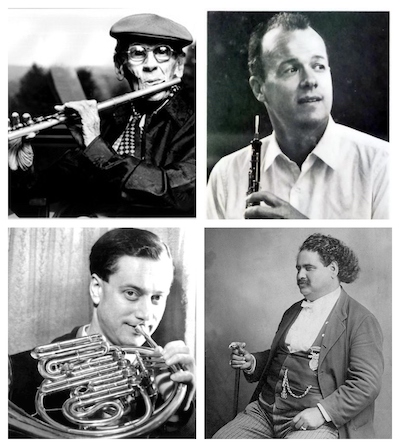By Daniel Hathaway

. Agenda: Bach at Noon at Trinity & Puccini’s wild west opera at Severance
. Almanac: remembering four musicians — Marcel Moyse, John de Lancie, Dennis Brain & John William Boone (pictured)
HAPPENING TODAY:
12:00 pm – Trinity BrownBag Concerts: Bach Fest 6. James Thompson, violin (C Major Sonata) Todd Wilson, organ (Prelude & Fugue in G, BWV 541). Trinity Cathedral, Free. Click here for live stream.
7:30 pm – The Cleveland Orchestra: Puccini’s Girl of the Golden West. Franz Welser-Möst, conductor, Emily Magee, soprano (Minnie), Roman Burdenko, bass (Jack Rance), Limmie Pulliam, tenor (Dick Johnson), Tony Stevenson, tenor (Nick), and Scott Conner, bass (Ashby). Severance Music Center.
Visit the Clevelandclassical.com Concert Listings page for details including addresses of venues and information about even more concerts in Northeast Ohio.
ALMANAC FOR MAY 17:
By Jarrett Hoffman
As Peter Phillips wrote in a 2014 article for The Spectator, the reputation of performing musicians “can never be as secure as those of composers: the former are recreative artists, the latter creative, with posterity always remembering the creative ones, no matter how good the former may have been in their lifetimes.”
Sadly, Phillips seems to be correct in that assessment. Recently passed performers still linger in our memories. But long-gones ones seem to be only remembered here and there, and often only by the practitioners of their same instrument or voice type, in a way that ends up feeling nerdy.
Think of all the incredible performers around us today. What an insulting prospect for them.
And so, despite the fact that Erik Satie (born today in 1866) and Paul Dukas (died on this date in 1935) are the most recognized names to grace this date in classical music history, let’s set to work rectifying this imbalance, even just a little bit, with a celebration of four performers whose names shan’t be lost to history.
Marcel Moyse, born on this date in 1889 in St. Amour, France, is a legend of the flute. He played principal in several French orchestras, appeared widely as a soloist, and left behind a long list of recordings. Having taught at the Paris and Geneva Conservatories, written 37 flute etude books, and given a famous series of master classes on several continents, his teaching is just as renowned. He also co-founded the Marlboro School of Music in Vermont, where he moved in 1949.
Pay a visit to the Marcel Moyse Society here, and listen to his short and beautiful recording of Dvořák’s Humoresque (arranged by Kreisler), full of lyrical expression and subtlety.
Sticking with the woodwinds, we move to oboist John de Lancie, who passed away of leukemia on May 17, 2002 in Walnut Creek, California. (His son is the actor of the same name.) And though he was also born in California, it’s in the City of Brotherly Love where he became most famous, holding the principal chair in the Philadelphia Orchestra for 23 years and serving as director of the Curtis Institute of Music for 8 years — until his controversial forced resignation — in addition to teaching at the school.
Although he didn’t commission or premiere it, de Lancie is forever tied to one of the most important works for oboe. Having served in the U.S. Army in World War II, de Lancie met Strauss in Bavaria following the war, when his unit was securing the area around Garmisch-Partenkirchen, where Strauss was living. He asked the composer if he had thought about writing a concerto for oboe. The answer was no, but only several months later, lo and behold, Strauss had put the finishing touches on the Oboe Concerto. Listen to de Lancie play it in a recording here.
Quotes about hornist Dennis Brain — who was born on this date in 1921, and died 36 years later in a car crash — can come across as over-the-top, that is until you hear his superb playing. Among the many accomplishments he achieved in his short life are his recordings of Mozart’s four horn concertos with Herbert von Karajan and the Philharmonia Orchestra. Listen here, and be wowed.
And John William Boone (“Blind Boone”) was born on May 17, 1864 — during the Civil War — in a Union Army camp near Miami, Missouri, his mother an escaped “contraband” slave. Blind from infancy, his ear and talent for music became clear from an early age. In his teens, he began a nearly 50-year career as a pianist and composer, eventually finding great success playing classical music, popular music, folk tunes, and spirituals, appealing to a wide audience. As for his own compositions, many scholars now see them as an important precursor to ragtime.
Read more about his fascinating life from Historic Missourians. Then listen to Boone’s own Carrie’s Gone To Kansas City here, and the edited piano roll he recorded of When You and I Were Young, Maggie here.



